May is Mental Health Awareness Month — a time when we pause to recognize that mental health is health. For those of us in recovery, whether from substance use, mental health challenges, or both, this month offers a powerful opportunity: to reflect, reconnect, and remind ourselves that taking care of our mental health is not just important — it’s foundational to lasting recovery.
At the heart of recovery is hope. And at the heart of hope is connection — connection to ourselves, to others, and to the pathways that support us. As peer recovery coaches, we know that no two journeys are the same. Each person’s recovery is as unique as their fingerprint, and so are their mental health needs. That’s why a multiple pathways approach to recovery is essential — and why mental health needs to be woven into every pathway we honor and support.
Recovery and Mental Health Go Hand-in-Hand
For many people, recovery from substance use and recovery from mental health challenges are deeply connected. Sometimes mental health conditions like depression, anxiety, PTSD, or bipolar disorder are part of what fuels substance use. Other times, they emerge or become clearer during the healing process.
Taking a recovery-centered view of mental health means recognizing that healing is holistic. When we support a person’s mental health, we are strengthening their recovery — not treating something separate, but nurturing the whole person.
As peer coaches, one of the most powerful things we can do is create spaces where it’s safe to talk about mental health openly, without judgment. To remind those we support that needing help, taking medication, attending therapy, using peer support groups, practicing mindfulness — all of these are valid and courageous choices in recovery.
Embracing Multiple Pathways to Mental Wellness
There is no single “right” way to care for mental health in recovery. Just as there are many paths to sobriety, there are many approaches to mental wellness. Some people find strength in therapy and counseling. Others lean into peer-led groups like SMART Recovery, Celebrate Recovery, Refuge Recovery, or mental health peer support circles. For others, medication plays an essential role. Some people find healing through creative expression, faith traditions, exercise, service to others, or building strong cultural and community connections.
As peer recovery coaches, our role is not to prescribe a path but to walk alongside, offering hope, information, and support as people explore what works for them.
Some ways we can support mental health across pathways include:
-
Normalizing conversations about mental health and medication-assisted treatment (MAT).
-
Connecting people with peer-run mental health resources like Warm Lines or Recovery Community Organizations.
-
Encouraging holistic self-care: rest, nutrition, movement, creative activities, and spiritual practices.
-
Helping individuals advocate for themselves in healthcare settings.
-
Supporting harm reduction approaches that prioritize safety, dignity, and mental wellness.
-
Empowering individuals to build resilience through peer connections and recovery capital.
You Are Not Alone
If you are in recovery and struggling with your mental health, please know: you are not alone. Reaching out for support is a sign of strength, not weakness. Healing takes time, and it’s okay to need different supports at different seasons of your life.
This Mental Health Awareness Month, let’s commit to honoring every person’s path — and every part of their humanity. Recovery is possible. Mental wellness is possible. Together, through connection, compassion, and peer support, we can help each other thrive.
You are worthy of care. You are worthy of hope. You are worthy of recovery.


